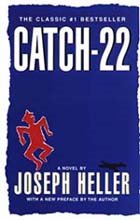
# Paperback: 464 pages
# Publisher: Simon & Schuster, reprint edition, 1996
# Price: $16.00
# ISBN: 0684833395
For so many of us growing up in the USA, our high school teachers assigned us Joseph Heller's Catch-22 as required reading, and I was among those assignees. I'm not sure why the requirement, other than perhaps some Catch-22 type of logic that everyone else was assigning it, so there, must be great, must read. I don't particularly remember liking the novel then, perhaps with no more substantial of a reason than -- just not my style. Reading the novel now, in midlife, my opinion (or my literary style) has changed little, but today, I can attempt to add to "not my style" perhaps a few deeper insights.
In this second read, I realize what so fails to appeal to me is Heller's slapstick, absurdist, repetitive and dizzyingly circular style of storytelling. At the same time, I fully realize this is also the appeal of the novel for many: it's absurdity. Indeed, time has tested Heller's topic of war having little logic or reason in the real world, mostly born of individual and governmental insanity, power plays and mere whim, male ego clashing and chest thumping. Few wars seem to have good reason for happening when one considers all the other possibilities of resolution. While leaders sit safely in secure offices on fortressed hilltops, the common soldier takes all the risks, offers up his/her body for battering, endures indescribable torments in battle, and often gives the ultimate sacrifice of life. Shall we debate the virtues of boxing rings for political leaders instead? Yes, war is absurd. And Heller captures this "crazy-making" truth in a crazy-making novel in which characters dance to illogical commands, spin in frustration, and dig themselves in ever deeper as they try harder and harder to dig themselves out. You know... as in war.
So I slogged through the pages like a good soldier. Characters leapt forward and backward in time, one event led to no other event, resolution rarely made a showing, and the dance of insanity kept the main lead. Even as I slogged, I could not deny what an excellent reflection of warring reality Heller's writing proved to be. Kudos for that. Redeeming factor.
And then, somewhere towards the final pages, I was somewhat won over. Without losing his voice of absurdity, the author had Yossarian, key player, say lines so absurd they rang true to the core, e.g. "but we don't want what we want!" and I could only shake my head and echo, oh indeed. We don't. When offered a bounty of temptations to sell out his soul, Yossarian denied them all, and in his crazy way, spoke utter sanity. How common is it to want something desperately much of our lives, only to realize we don't want it at all when fantasy turns into reality? A gold star for the author. Other episodes of Yossarian struggling to keep a fellow soldier alive even as his guts spill out, the sheer horror and despair and helplessness of the situation, hit target. Bravo.
This, and Heller's commentaries on man being little more than meat, fodder for the brutalities of war, resounded with such painful truth that today's reader can only look up at current events and current disasters and realize -- we are living in a world ruled by absurdities even today. History has taught us nothing.
And so, I could be convinced that Heller's novel is a classic. Perhaps it is.
No comments:
Post a Comment